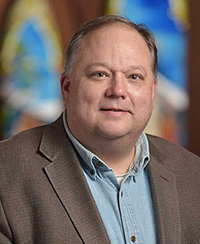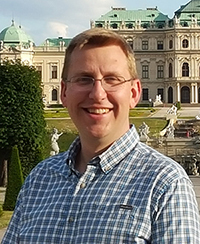 2015 Notre Dame Career Fair
2015 Notre Dame Career Fair
Analyzing sophisticated financial data in New York City. Pursuing a law degree at Georgetown University. Teaching hands-on engagement and empowerment skills to community leaders in Seattle.
Whether they begin their careers immediately, enroll in graduate school, or enter an elite public service program, history majors in Notre Dame’s College of Arts and Letters are well prepared for whatever path they choose.
 Daniel Graff
Daniel Graff
“In the Department of History, we don't train students for particular professions,” said Daniel Graff, the department’s longtime director of undergraduate studies and now the director of the Higgins Labor Program at Notre Dame’s Center for Social Concerns. “Instead, we teach them methods and practices of thinking about the world that help them pursue the widest variety of vocations imaginable.
“Our majors learn to appreciate complexity and contingency after exploring historical problems from multiple perspectives and different contexts, and this helps them develop the necessary skills to research, diagnose, and solve problems— whether the career they choose is medicine or management, teaching or investing, law or public service.”
According to Notre Dame’s Career Center, 49 percent of the history majors in the Class of 2014 chose to enter the workforce immediately. Their first positions included:
- Account manager at Aon Corporation
- Analyst at JP Morgan
- Project manager at Epic
- Teacher at Northridge Preparatory School
- Paralegal at Cleary, Gottlieb, Steen, & Hamilton
- Audit associate at PwC
Another 32 percent of the Class of 2014 began prestigious graduate programs, including:
- African studies at Yale University
- Law school at the University of Michigan
- Comparative politics at the London School of Economics and Political Science
- Israel studies at Hebrew University of Jerusalem
- Master of theological studies at Boston College
And 14 percent of the 2014 graduates chose to enter elite full-time service programs, such as:
- Alliance for Catholic Education in Brownsville, Texas
- L’Arche in Washington, D.C.
- Match Education in Boston, Mass.
Three percent of graduates chose to enlist in the military, and just 2 percent were still seeking employment six months after graduation.
 John Deak
John Deak
In all of their endeavors, history majors will use the skills they developed at Notre Dame, said Assistant Professor John Deak, the department’s new director of undergraduate studies.
“We train students to be able to see underlying causes and roots of problems—and, most importantly, to be able to articulate their thoughts in writing and speech,” he said. “We do this with rigorous courses and inspiring lectures that not only teach content but force students to ask big questions. And we do this with personal instruction, small seminars, and a faculty that sees the value in mentorship.
“Essentially, history at Notre Dame prepares our students to be the smartest people in the room—and that quality carries our graduates far.”